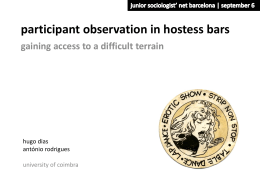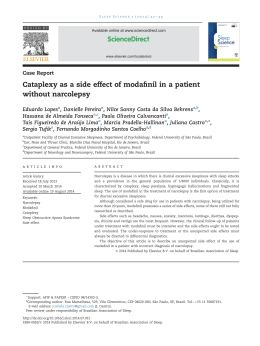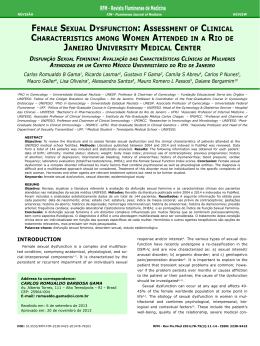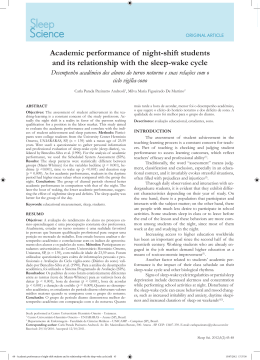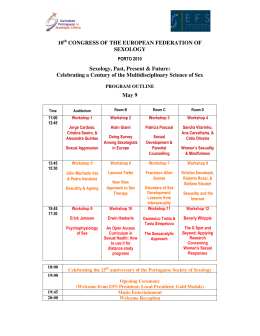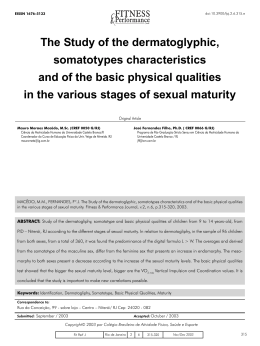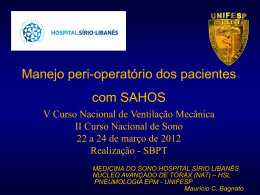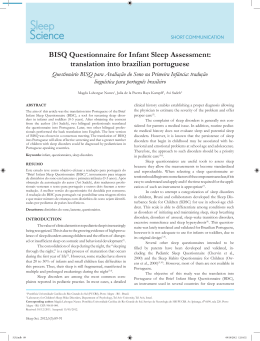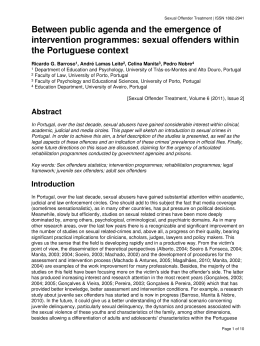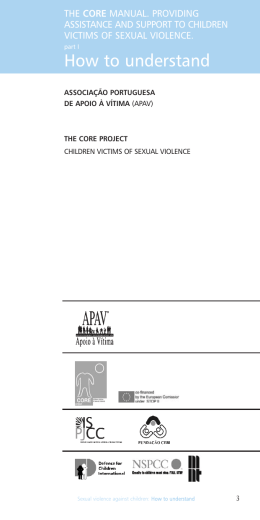CASE REPORT Sexual hypnagogic hallucinations and narcolepsy with cataplexy: a case report Alucinações hipnagógicas sexuais e narcolepsia com cataplexia: relato de caso Fernando Morgadinho Santos Coelho1,2,3, Alexander Moszczynski2, Marc Narayansingh2, Neal Parekh2, Marcia Pradella-Hallinan1 Abstract Sexual behavior can be associated with several stages of sleep, including both non-rapid eye movement and rapid eye movement stages of sleep. In narcoleptic patients, orgasmic cataplexy, or orgasmolepsy, and sexual hypnagogic hallucinations can be present. Although the association between narcolepsy and sexual behaviors has already been described, few reports describe the embarrassing circumstances for narcoleptic patients after vivid experiences during complex sexual hypnagogic hallucinations. This report describes an interesting case of a narcoleptic patient with sexual hypnagogic hallucinations associated with out-of-body experiences. Keywords: narcolepsy; hallucinations; cataplexy; sexual behavior; sexuality; humans; male, adult; case reports. Resumo O comportamento sexual pode ser associado a diversos estágios do sono, incluindo tanto o estágio do sono de movimentos rápidos dos olhos quanto os estágios sem movimentos rápidos dos olhos. Em pacientes narcolépticos, cataplexia orgásmica e alucinações hipnagógicas sexuais podem estar presentes. Embora a associação entre a narcolepsia e o comportamento sexual já tenha sido descrita, poucos relatos descrevem as circunstâncias embaraçosas para pacientes narcolépticos após vívidas experiências durante alucinações hipnagógicas sexuais complexas. Este relato descreve um interessante caso de um paciente narcoléptico com alucinações hipnagógicas associadas com experiências fora do corpo. Palavras-chave: narcolepsia; alucinações; cataplexia; comportamento sexual; sexualidade; humanos; masculino; relato de casos. INTRODUCTION Sexual vocalizations or conversation, masturbation, sexual fondling, sexual intercourse with or without orgasm, and assaultive sexual behaviors can be seen during sleep1. These interpersonal sexual behaviors during sleep have been associated with individual, familial, and legal repercussions2,3. After the correct diagnosis, treatment can minimize these symptoms. There are several differential diagnoses, which sleep specialists should be aware of4. Sexual behavior can occur in different stages of sleep, but it is most prevalent during non-rapid eye movement (NREM) sleep. Sexsomnia is the most common sexual sleep disturbance, and it is responsible for up to 50% of all sexual complaints during sleep. Another 29% of sexual complaints during sleep are the result of seizures1. Sexual behaviors may also occur in rapid eye movement (REM) sleep; however, this occurrence has not yet been documented with polysomnography. In elderly patients, sexual actions may be a manifestation of REM sleep behavior disorder (RBD). Orgasmolepsy or orgasmic cataplexy and sexual hallucinations have been described in narcolepsy patients5. Narcolepsy is characterized by the excessive daytime sleepiness (EDS), cataplexy, and sleep fragmentation due to impairment of the hypocretin system. Narcolepsy patients may also present sleep paralysis and hypnagogic hallucinations6,7. Recently, cataplexy has also been associated with sexual activity8. Orgasmolepsy is defined as a cataplexy concomitant to orgasm. Although orgasmolepsy may be observed in other sleep disorders, such as sleep apnea, sexprecipitating cataplexy has been described most commonly in patients with narcolepsy8. Another narcolepsy symptom related to sexual behavior is hypnagogic hallucinations (HH). Although the associa- Study carried out at Universidade Federal de São Paulo (UNIFESP), São Paulo (SP), Brazil. 1 Universidade Federal de São Paulo (UNIFESP), São Paulo (SP), Brazil. 2 Sunnybrook Health Sciences Centre, University of Toronto, Toronto, Canada. 3 Instituto Israelita de Ensino e Pesquisa do Hospital Israelita Albert Einstein, São Paulo (SP), Brazil. Financial support: AFIP & FAPESP – CEPID 98/14303-3. Conflict of interests: nothing to declare. Corresponding author: Fernando Morgadinho Santos Coelho – M1600, Sleep Laboratory – Neurology – Sunnybrook Healthy Sciences Centre – 2075, Bayview Avenue, Toronto, Ontario, Canada, M4N3M5 – E-mail: [email protected] or [email protected] Received: June 6, 2011; Accepted: August 4, 2011 Sleep Sci. 2011;4(3):������� ������ –112 Coelho FMS, Moszczynski A, Narayansingh M, Parekh N, Pradella-Hallinan M tion between narcolepsy and sexual behaviors has already been described, few reports describe the embarrassing circumstances experienced by narcolepsy patients after vivid experiences during complex sexual HH6. Additionally, there can be forensic implications due to false accusations of sexual assault emerging from vivid sexual HH. These hallucinations can be misinterpreted as psychotic manifestations, which can result in delayed diagnosis and treatment of narcolepsy6. This case report illustrates a peculiar and interesting case of narcolepsy and sexual HH with out-of-body experience (OBE). CASE REPORT A 46-year-old male patient, presenting with history of EDS for 16 years, generalized cataplexy, sleep paralysis, and HH. No relatives complained of EDS or cataplexy. The patient denied history of trauma, seizures, or use of illicit drugs. He is a former smoker, and he was on medication to treat hypertension. Interestingly, the main concern of the patient during the first visit was about HH. He experienced sporadic HH throughout the day, but it also frequently occurred during the night. He has been married for over 15 years, and his sexual HH had been interfering with the couple’s sexual relations for the past six years. During sexual HH, he saw his wife and himself in action, like an OBE, concomitant with feelings of floating without cataplexy. No dreams or hypnopompic states were related. Sexual HH typically occurred immediately after onset of sexual activity, and frequently interrupted it. General and neurologic exams were normal. Polysomnography was normal, and no REM abnormalities were seen. Multiple sleep latency test (MLST) revealed five sleep-onset rapid eye movement sleep periods (SOREMP) with a mean latency of four minutes. HLA-DQB1*0602 was positive and his hypocretin-1 level was less than 40 pg/mL. The patient was treated with methylphenidate (10 mg – tid) and amitriptyline (50 mg - bedtime dose), which completely removed sexual HH. Residual EDS was seen. Methylphenidate was replaced with modafinil, which improved daytime alertness. The patient provided written informed consent allowing for the use of his clinical data in the research. DISCUSSION Although sexual HH experiences have been described, sometimes it is difficult to differentiate them from psychotic hallucinations. Psychotic disorders are not associated with REM dyscontrol6. No biomarkers are available to identify these diseases and therefore clinical characteristics are currently fundamental9. Clinical information and electrophysiologic studies help to differentiate the sexual behaviors during sleep3. Although patients who suffer from sexsomnia usually cannot remember abnormal sexual behavior during sleep, patients with nocturnal seizures are frequently able to recall these episodes, or they are at least partly aware of the events1,3,8. Details of the episode can be used as important clues to characterize the differential diagnosis of abnormal sexual behavior during sleep. In all cases, electrophysiological investigation is appropriate8. The main difference between this case and others described in the literature is the coupling of OBE with sexual HH10. OBE is seen in sleep disorders, such as narcolepsy, and in near death experiences. Different approaches have been employed to explain OBE including the paranormal, mystical, psychological, and medical. Hallucinations are a common feature of narcolepsy, occurring typically at sleep onset. Similarly, patients with near death experiences can also describe hallucinatory experiences11. It has been proposed that cerebral dysfunction of the temporo-parietal junction or amygdala region in both these instances are mostly responsible for this phenomenon10. In recent years, the understanding of narcolepsy pathophysiology has been growing12. Dysfunction in the hypocretin-1 system has been directly implicated as the cause of narcolepsy with cataplexy. However, further studies must be conducted in order to completely elucidate the complex pathophysiology underlying sexual HH. REFERENCES 1. Schenck CH, Arnulf I, Mahowald MW. Sleep and sex: what can go wrong? A review of the literature on sleep related disorders and abnormal sexual behaviors and experiences. Sleep. 2007;30(6):683-702. 2. Andersen ML, Poyares D, Alves RS, Skomro R, Tufik S. Sexsomnia: abnormal sexual behavior during sleep. Brain Res Rev. 2007;56(2):271-82. 3. Della Marca G, Dittoni S, Frusciante R, Colicchio S, Losurdo A, Testani E, et al. Abnormal sexual behavior during sleep. J Sex Med. 2009;6(12):3490-5. 4. Guilleminault C, Moscovitch A, Yuen K, Poyares D. Atypical sexual behavior during sleep. Psychosom Med. 2002;64(2):328-36. 5. Oudiette D, De Cock VC, Lavault S, Leu S, Vidailhet M, Arnulf I. Nonviolent elaborate behaviors may also occur in REM sleep behavior disorder. Neurology. 2009;72(6):551-7. 6. Szucs A, Janszky J, Holló A, Migléczi G, Halász P. Misleading hallucinations in unrecognized narcolepsy. Acta Psychiatr Scand. 2003;108(4):314-6; dicussion 316-7. 7. Littner MR, Kushida C, Wise M, Davila DG, Morgenthaler T, Lee-Chiong T, et al. Practice parameters for clinical use of the multiple sleep latency test and the maintenance of wakefulness test. Sleep. 2005;28(1):113-21. Sleep Sci. 2011;4(3):������� ������ –112 111 112 Sexual hypnagogic hallucinations 8. Poryazova R, Khatami R, Werth E, Bassetti CL. Weak with sex: sexual intercourse as a trigger for cataplexy. J Sex Med. 2009;6(8):2271-7. 9. Coelho FM, Pradella-Hallinan M, Predazzoli Neto M, Bittencourt LR, Tufik S. Prevalence of the HLA-DQB1*0602 allele in narcolepsy and idiopathic hypersomnia patients seen at a sleep disorders outpatient unit in Sao Paulo. Revista Bras Psiquiatr. 2009;31(1):10-4. Sleep Sci. 2011;4(3):������� ������ –112 10.Nelson KR, Mattingly M, Schmitt FA. Out-of-body experience and arousal. Neurology. 2007;68(10):794-5. 11.Blanke O, Landis T, Spinelli L, Seeck M. Out-of-body experience and autoscopy of neurological origin. Brain. 2004;127(Pt 2):243-58. 12.de Lecea L. A decade of hypocretins: past, present and future of the neurobiology of arousal. Acta Physiol. 2010;198(3):203-8.
Baixar
